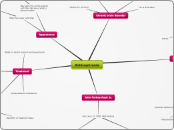Schizophrenia
John Forbes Nash Jr.
Born June 13, 1928, West Virginia
Studied at Carnegie Mellon University
and Princeton University
Mathematics
Economy
Equilibrium theory
Nobel Memorial Prize in Economic Sciences
John von Neumann Theory Prize
Leroy P. Steele Prize
Diagnosed with schizophrenia
Auditory and perceptual disturbances
Delusions
Lack of motivation for life
Mild clinical depression
Insulin shock therapy
Antipsycholitc medicine
Chronic brain disorder
Hear voices, see people, think others are reading your mind, or controlling you
Terrified, withdrawn, agitated
Starts ages 16-30
Men experience symptoms earlier
1% of Americans
Brain chemical malfunction
Neurotransmitters
Dopamine
Gluamate
Develop higher functioning skills
Causes are unknown
Appearance
May seem fine on the exterior until they talk about what is going on inside
Withdraw, isolation, unusual thoughts, family history of psychosis
Prodomal period
Brain has larger ventricles
Less gray matter
More activity
Less activity
Symptoms
Positive
Psychotic behaviors
Lose touch with reality
Come and go
Hallucinations
Delusions
Negative
Disruptions in normal
behavior and emition
Often mistaken for depression symptoms
Flat affect (blunted affect)
Lack of emotion and behavior
Poor interaction skills
Talking
Cognative
Subltle
Cause great emotional stress
Make it hard to live a normal life
Trouble focusing and remebering
Hard to understand simple tasks
and decision making
Treatment
Based on clinical research and experiments
Antipsychotic medications
Don't cure the patient, just reduce symptoms
Best form of treatment today
Side effects
Drowsiness/restlessness
Dry mouth
Blurry vision
Tremors/muscle spasms
Anidepressants medications
Electroconvulsive Therapy (ECT)
Electrical current applied to the breain
Induces a seizure
Used as last resort
Given three times a week f
or two to four weeks
High success rate
Works rapidly
Side effects
Misuse of equiptment
Temporary Confusion and head pain
